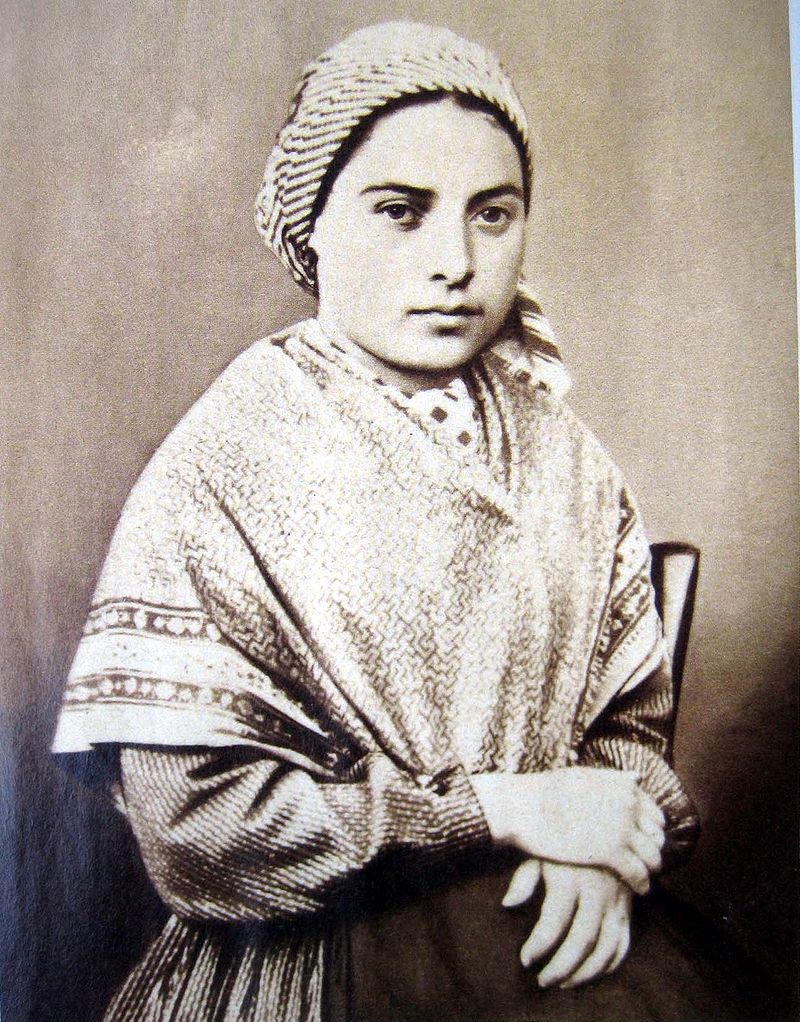Sometimes I wonder if the stories that we have all heard concerning saints who did not appear to be intellectually gifted might mislead many people into thinking that sanctity does not require any special focus on the development of the mind.
For example, how many Catholics out there might think something like the following:
Well, education is very important, but, thankfully, it is not required for sanctity. I mean, look at me, I was a below average Geometry student and I seem to be OK. Or take dear Saint Bernadette. She was a poor learner and could barely read and write. Yet what a marvelous saint!

Perhaps someone hoping to rationalize his choice way back in high school to study Spanish instead of Latin, or Graphic Design instead of Great Books, might say,
Look at those simple fishermen that Our Lord used to build His Church. The brightest bulbs on the Christmas tree? No sir! The sharpest knives in the drawer? I don’t think so! But did they have faith? Yes they did. And that is what is important!

How many Catholics have appealed to Saint Joan of Arc and Saint Joseph Cupertino to argue that the development of the intellectual virtues is not of prime importance? They might say,
Thank goodness that holiness does not depend on being smart! Good-ole Saint Joseph Cupertino knew that. He was so ignorant that even the Franciscans turned him away! But did that stop him from levitating? Did that stop him from bringing many others into Christ’s fold? No!

Another might assert that while the study of Latin and Ancient Greek is laudable for those who might be attracted to these historical and obsolete intellectual artifacts, the serious pursuit of these dead languages is, nonetheless, not really incumbent upon the ordinary Christian. To exemplify his position, he might say,
Take good St Joan, for heaven’s sake! She was the illiterate daughter of a farmer. She was a mere uneducated peasant. Did she know Latin? No! Did she know Greek! No! And yet did this stop her from becoming the heroine of France and one of the greatest among the pantheon of canonized saints! No!

I have a suspicion that the relative scarcity of good Catholics that choose to send their children to schools which are devoted to Catholic liberal education has something to do with this. That is to say, that for most Catholics, liberal education is something of a superfluity, an extra, and given the time and expense of obtaining one, it is easily dismissed as being non essential for the formation of virtue. Liberal education is a privilege only for those who have the time and inclination.
In other words, I wonder if many Catholics think about sanctity as having not much to do with a person’s intellectual life, but rather with his moral life? This unspoken and, I hesitate to say, even anti-intellectual philosophy would go far to explain why Catholic liberal education is not a primary concern for many Catholics.
I could be wrong, but at least this theory has substantial explaining power for why the majority of Catholics, perhaps unwittingly, avoid demanding that their children be formed in intellectual virtue (which is the defining feature of a liberal education).
But isn’t each person called to holiness? And doesn’t this call to holiness mean being called to be like Christ? Are we not all called to be ‘another Christ’? Christ, however, had all of the human virtues. Therefore, in order to be like Him, in a way that respects our nature, we must try to at least have all of the human virtues.

What precisely were the kinds of human virtues that Christ had? St. Thomas provides an accessible answer to this question,
Human virtue is a habit perfecting man in view of his doing good deeds. Now, in man there are but two principles of human actions, viz. the intellect or reason and the appetite: for these are the two principles of movement in man… Consequently every human virtue must needs be a perfection of one of these principles. Accordingly if it perfects man’s speculative or practical intellect in order that his deed may be good, it will be an intellectual virtue: whereas if it perfects his appetite, it will be a moral virtue. It follows therefore that every human virtue is either intellectual or moral.
In other words, there are precisely two kinds of human virtue: intellectual and moral. Therefore if Christ had all virtue then he too obviously possessed both moral and intellectual virtue. Q.E.D.

So what are the moral virtues? Simply put, they are all the virtues contained under the four general cardinal virtues: prudence justice, temperance and fortitude. ‘Cardinal’ of course comes from the latin word ‘cardo, cardinis’ which means hinge.

The cardinal virtues might be thought of as the four hinges upon which the entire gate of moral virtue hangs, or rather, each cardinal virtue appears to be the genus of many subsidiary virtues (which, I suppose, are thought of as hanging upon the cardinal virtues.) For example, the virtues of chastity and sobriety hang on the virtue of temperance; they are forms of temperance. 
The intellectual virtues, on the other hand are five in number: the two practical intellectual virtues art and prudence. And the three speculative intellectual virtues Natural Understanding, Science and Wisdom.
Now if man is distinguished from everything else in the world by his reason, wouldn’t it make sense that the acts of reason are distinctively human? And remember, virtue is, broadly speaking, nothing more than a quality of a thing which makes it excellent in its own act.

A virtue is an excellence of the thing. So for example if one were to take a knife, we might ask,
What is it that makes a knife excellent? What is the virtue of a knife?

We might ask ourselves,
What is it that makes a knife excellent? What is a knife supposed to do?
to which the obvious and spontaneous reply is,
A knife is supposed to cut. And it is sharpness that allows a knife to cut well.
Voila! we have the virtue of a knife. Sharpness allows a knife to perform its own act well and therefore sharpness is the virtue of a knife.
And now we ask ourselves what is it that makes a human being excellent? What is it that enables a human being to perform his own act, his distinctive act, well?
Now all of the virtues enable the person to perform his actions well. But it is the intellectual virtues, most especially the three speculative intellectual virtues, that enable a person to perform his distinctively human act well.
And so we might say with special enthusiasm that of all the virtues, understanding, science and wisdom should be held in highest esteem because these virtues are especially related to the human person in the performance of his own distinctively human act; the intellectual virtues appear to hold a chief position among human virtues.
Now, my dear reader, ask yourself: why doesn’t anyone ever talk about these virtues if they are so important?
And further, what precisely are these virtues?
If these are the chief human virtues oughtn’t we to know what they are? How can we develop them in ourselves if we do not even know what they are and how they are distinguished from one another?
Well, I suppose we could try to give an unsatisfactory answer in a nut shell. But we might ask ourselves why Saint Thomas Aquinas wrote extensively about the virtues well into his Summa (e.g. see Prima Secundae questions 49-67).
Perhaps to understand the virtues requires a lengthy discussion. And who has time for that?!
Yet, surely we would like our children to know what virtue is and what are the chief human virtues. Maybe one day they will also even develop these virtues!
Perhaps we need to provide our children with a genuine Catholic liberal education?




Well said! I notice that the saints you mentioned have a couple of interesting traits in common. They were all born into extreme poverty, and thus did not have the means to obtain an education, and they were all blessed with mystical visions. Maybe we should start asking our mediocre geometers and their parents whether they can make the same claim.
Yes, good point! In lieu of mystical visions and other extraordinary graces I think our students better keep focused on their books!
I love getting to learn! And learning the faith! What moral virtue I have is largely grown by my intellectual learning, even if it be as simple as remembering the Proverbs that have been memorized or read so very often. But how much poorer my life would be without the poetry and plays and philosophy that I grew up reading! And how much poorer would be my soul! I could not love God so well as I do now, I think, had I not had the books and teachers and examples that I have had in my life.
Amen! Very well said Sarah! And how appropriate it is to bring up the importance of the teachers that we have all had!
This is an excellent blogpost. I’ve had this same nagging feeling for some time now, but you expressed it beautifully. We must cultivate BOTH sets of virtues and reject any false dichotomy that may exist between the two of them. We can walk and chew gum at the same time.
Bravo! Amen
Thank you for this and other mini Aquinas lessons! I may have misunderstood and misread but is it possible to distinguish between education on one hand and schooling- literacy on the other? By this I mean the saints mentioned may have lacked schooling and literacy but were educated in the broader senses? They were socialized and members of communities, (not the least is Communion of the Saints!), has been catechized, spiritually formed, and capable of many human deeds that demand some type of learning, knowing, and practical expertise.
As an educator and student I often think education is much bigger than schools and literacy . Yet I may have missed something. God bless.
Erin,
Yes! I think you are absolutely correct in drawing a distinction between ‘education’ and ‘schooling’.
I can’t tell you how many people I have met -who have been schooled for 16 + years and yet still say “I have a graduate degree in X, but I don’t have an education”